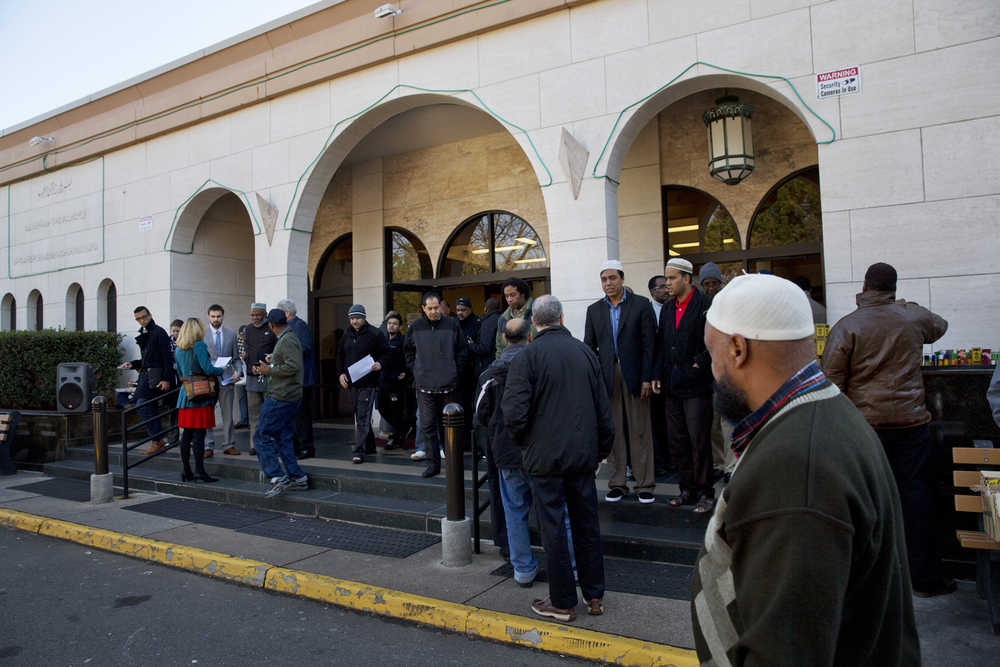WASHINGTON — Americans place a higher priority on preserving the religious freedom of Christians than for other faith groups, ranking Muslims as the least deserving of the protections, according to a new survey.
Solid majorities said it was extremely or very important for the U.S. to uphold religious freedom in general. However, the percentages varied dramatically when respondents were asked about specific faith traditions, according to a poll by The Associated Press and the NORC Center for Public Affairs Research.
Eighty-two percent said religious liberty protections were important for Christians, compared with 61 percent who said the same for Muslims. About seven in 10 said preserving Jews’ religious freedom was important, while 67 percent said so of Mormons. People who identified with no religion were ranked about even with Muslims in needing support to live out their beliefs.
Charles Haynes, director of the Religious Freedom Center of the Newseum Institute, said the findings reflect deep divisions among Americans about the very definition of religious liberty, which has taken on newly politicized meanings in a time of debate over gay marriage and the threat from Islamic extremists.
“Religious freedom is now in the eye of the beholder,” Haynes said. “People in different traditions, with different ideological commitments, define religious freedom differently.”
The poll was conducted Dec. 10 through Dec. 13, after Islamic extremist attacks in Paris and San Bernardino, California, and during intensifying anti-Muslim rhetoric by Donald Trump and other candidates for the Republican presidential nomination. The furor has led to a spike in vandalism of mosques and harassment of U.S. Muslims over the last month.
In the survey, 88 percent of Republicans said it was important to protect the religious liberty of Christians, while only 60 percent said so for Muslims. Democrats also ranked religious freedom for Muslims as a lower priority. Eighty-three percent of Democrats said the protections were important for Christians, while only 67 percent said so for Muslims.
A Pew Research Center survey last year found an increasing share of Americans believe Islam is more likely than other religions to encourage violence among its followers. Several outspoken critics have emerged who argue Islam itself is a threat to the U.S.
“These numbers seem to be part of a growing climate of anti-Muslim sentiment in the United States,” said Madihha Ahussain, an attorney for Muslim Advocates, a California-based civil rights group. “This climate of hatred has contributed to dozens of incidents of anti-Muslim violence in recent weeks.”
Helen Decker, 65, a West Texas Christian who reads the Bible regularly, believes strongly that religious freedom should be provided to people of all faiths or no faith, including for her grandson whom she said is an atheist. But she said Muslims can only earn the same religious liberty protections “under certain circumstances — that they can show that they are not a radical Muslim.”
“Muslims — they need to be protected just like Christians, unless they pose harm to human life,” Decker said.
But John Ashford of Chicago, who is retired from the U.S. military and the Postal Service, said “it’s not right” to deny religious liberty protections to Muslims. He said officials have been showing too much deference to Christians for political reasons, in what he considers a threat to the separation of church and state.
“There’s supposed to be equal protection under the law — that’s what the Constitution says,” he said. “If you’re not doing that, you’re doing something wrong.”
Public discussion about religious freedom in 2015 focused largely on demands for government accommodation for objectors to same-sex marriage, which became legal nationwide in June. The debate played out most dramatically in the conflict over Indiana’s Religious Freedom Restoration Act and in the case of Kentucky clerk Kim Davis, who spent five days in jail for refusing to issue marriage licenses to same-sex couples.
Those who oppose steps to accommodate religious objections to same-sex marriage see such exemptions as an attempt to undermine newly won rights for gays and lesbians.
But advocates for broad exemptions, including U.S. Roman Catholic bishops and Southern Baptist leaders, say the requests are in line with the longstanding American tradition of protecting individual conscience.
Greg Scott of the Alliance Defending Freedom, a Christian public interest law firm, said a focus on protecting Christians right now “makes sense in that Christians today are facing mounting threats to their religious liberty by acts of state officials and bureaucrats.” AP-NORC polls have found dwindling confidence in the government’s defense of religious liberty, with 75 percent in 2011 saying the government was doing a good job, compared with 55 percent who said so this month.
In the latest survey, eight in 10 Americans said it was very or extremely important for people like themselves to be allowed to practice their religion freely.
But Eric Rassbach, an attorney with the Becket Fund for Religious Liberty, a public interest law firm that takes clients of all faiths, said “people may not realize you cannot have a system where there’s one rule for one group and another rule for a different group you don’t like.”
“No religion is an island,” Rassbach said. “If somebody else’s religion is being limited by the government, yours is liable to be limited in the same way. Even if you only care about your own particular group, you should care about other groups, too, because that’s the way the law works.”
The AP-NORC poll of 1,042 adults was conducted online and by phone using a sample drawn from NORC’s probability-based AmeriSpeak panel, which is designed to be representative of the U.S. population. The margin of sampling error for all respondents is plus or minus 3.9 percentage points.

